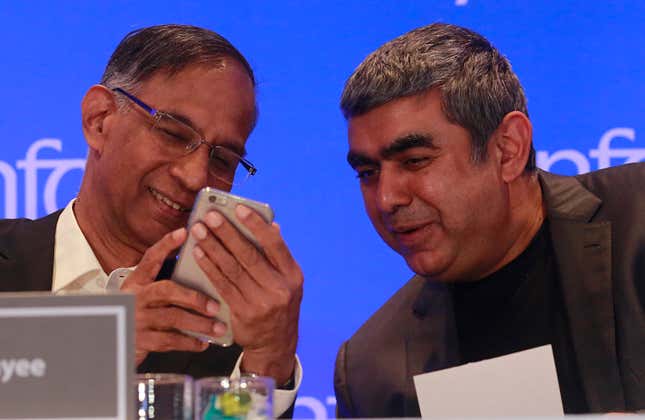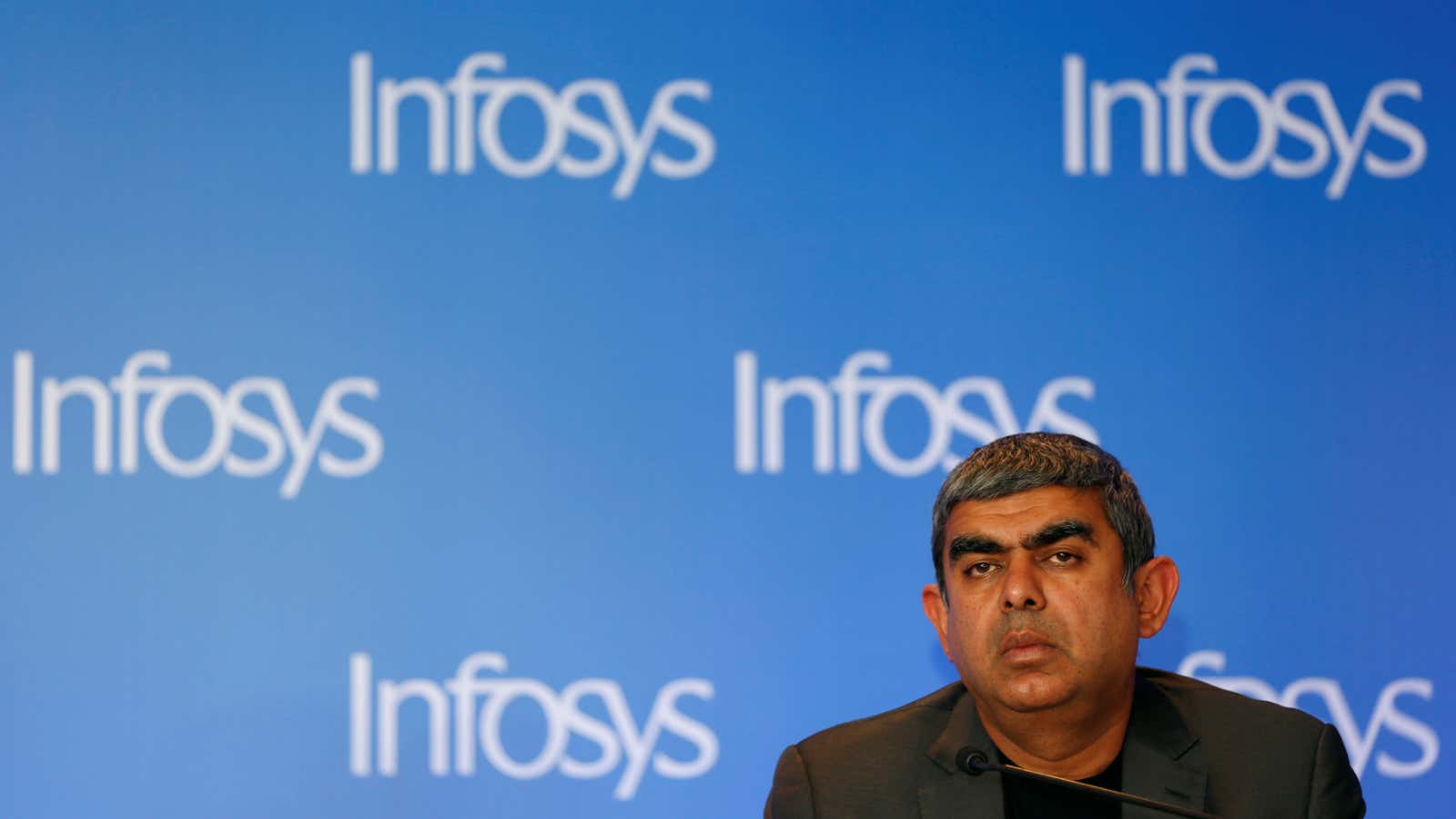At 6pm on Feb. 13, R Seshasayee, chairman of the board of Infosys, walked into a packed room in a Mumbai hotel and began with a warning: It was going to be a long press conference.
He was prescient.
For two hours, the board of India’s second-largest information technology (IT) services company, including CEO Vishal Sikka, weathered a barrage of questions from the media. Infosys COO Pravin Rao and independent director Roopa Kudva were present in person. Other board members joined through phone and video conference. Apart from Seshasayee and Sikka, nobody spoke a word, though.
By the time it ended, the crisis at one of India’s most celebrated companies had somewhat abated. This much was clear: Course correction has begun, just days after the board was accused of mis-governance by Infosys’s co-founders. The path, however, remains distinctly unclear.
On Feb. 10, founder and former chairman NR Narayana Murthy had told The Economic Times newspaper that there had been “a concerning drop in governance standards at Infosys.” Among other things, Murthy expressed displeasure over the hefty severance packages paid to some departing employees, particularly former CFO Rajiv Bansal. A number of other former top executives, including former CFOs V Balakrishnan and TV Mohandas Pai, too, made their misgivings public subsequently, even calling for Seshasayee’s dismissal.

The chairman of the board, though, struck a conciliatory note. “I don’t look at it as a battle,” he said, early in his 45-minute-long opening remarks, “There is no conflict of interest, there is convergence of interest.” But Seshasayee did concede that, although the board had stayed in constant touch with the co-founders, including Murthy, it may not have been enough.
He insisted that none of the allegations leveled against him and the rest of the board hold water. In fact, Seshasayee, backed by Sikka, provided a point-by-point rebuttal of the issues raised by Murthy in his interview and other media reports that followed.
Here are the key points:
1. Rajiv Bansal’s severance: Last week, Murthy expressed his displeasure over the Rs17.4 crore severance paid to former CFO Rajiv Bansal, who quit in October 2015. Calling it an example of poor corporate governance, he said, ”Such payments raise doubts whether the company is using such payments as hush money to hide something.”
Board’s reply: Seshasayee staunchly denied that any such “hush money” was involved, with Sikka adding that Bansal’s exit was due to “team chemistry issues.” However, the chairman acknowledged that there was a “level of subjectivity” in the severance package, which, in retrospect, shouldn’t have been there. Also, Bansal had eventually been paid only around Rs5 crore of the severance package. Since then, Seshasayee said, the process of determining the severance packages for key management personnel had been reworked and formalised.
2. David Kennedy: On Feb. 08, several newspaper reports said that Infosys’s founders had written a letter to the board, expressing their displeasure over the Rs5.9 crore severance pay given to former compliance officer David Kennedy.
Board’s reply: Kennedy’s severance package, Seshasayee explained, was in accordance to a clause in his employment contract.
3. Vishal Sikka’s compensation: Reports last week also said that Infosys’s founding team was concerned about the hefty salary of Rs49 crore paid to Sikka for the 2016 financial year, which was over 750% higher than the Rs4.6 crore he drew between June 2014 and March 2015.
Board’s reply: Seshasayee explained that Sikka’s compensation comprised of fixed (cash) and variable components. The former (at $4 million) was actually lower than the CEO’s previous fixed component of $5.08 million. The variable component, which increased, also comprised of two parts: one linked to the length of his tenure at Infosys and the other tied to the company’s performance. The compensation was benchmarked against peer companies in the US by a global consultant, Seshasayee added, and “was meant to ensure we give a motivational package to Vishal (Sikka) to lead this company into the future with very ambitious targets.”
4. Appointment of new directors: Infosys’ board has faced criticism over the appointment of Punita Kumar Sinha and DN Prahlad as independent directors. Some have been critical of Sinha’s appointment since she is married to India’s junior aviation minister, Jayant Sinha, which could potentially give her access to sensitive government information. Prahlad, on the other hand, is a distant relative of Murthy. He was also one of the earliest employees of Infosys.
Board’s reply: Both directors were selected because of their educational and professional qualifications, Seshasayee said, and the usual process was followed to vet both. With particular reference to Sinha, he added, “I am sure you would agree that a woman should not be judged by the profession of her spouse.”
Despite the robust defence of its actions, the board is clear that it won’t ignore the criticism coming from the company’s co-founders. Quite to the contrary, Seshasayee said, the board is keen to find a better way to engage with shareholders, for which it has sought the services of Mumbai-based law firm, Cyril Amarchand Mangaldas.
“How do we make sure that in the process of building the company’s governance structure, we ensure that both the independence and the distributed interests of all the shareholders are adequately represented on the board?” he said, “And how do we do that within a legal framework?”
It will be, by any measure, a tricky balance to find and maintain. The co-founders continue to be Infosys’s largest shareholders with a combined stake of 12.75%. This includes Murthy (CEO from 1981 to 2002), Nandan Nilekani (CEO from 2002 to 2007), Senapathy Gopalakrishnan (CEO from 2007 to 2011), SD Shibulal (CEO from 2011 to 2014), K Dinesh, NS Raghavan and Ashok Arora.
Without question, Seshasayee and his fellow board members will be under close scrutiny. It’s not something lost on the veteran chartered accountant. “We live in a glass house, which is a good thing,” he said, “because we cannot misbehave, somebody is always looking at us.”
But there was also a tacit acknowledgment that too much attention will hurt, not help, Infosys. ”If we are living in a glass house,” Seshasayee added, “please don’t stare at us too long because we have to get on with the job.”
That may be wishful thinking. After all, Sikka has promised to grow Infosys’s annual revenue from around $9 billion at the moment to $20 billion by the year 2020. That’s a story no one’s willing to miss.
Stay tuned.
